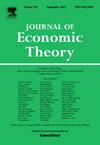New fertility patterns: The role of human versus physical capital
IF 1.2
3区 经济学
Q3 ECONOMICS
引用次数: 0
Abstract
We use an overlapping generations model with physical and human capital, and two reproductive periods to explore how fertility decisions may differ in response to economic incentives in early and late adulthood. In particular, we analyze the interplay between fertility choices—related to career opportunities—and wages, and investigate the role played by work experience and investment in both types of capital. We show that young adults postpone parenthood above a certain wage threshold and that late fertility increases with human capital. The long run trend is either to converge to a low productivity equilibrium, involving high early fertility, investment in physical capital and relatively low income, or to a high productivity equilibrium, where households postpone parenthood to invest in their human capital and work experience, with higher late fertility and higher levels of income. A convergence to the latest state would explain the postponement of parenthood and the mitigation or slight reversal of fertility decrease in some European countries in recent decades.
新的生育模式:人力资本与物质资本的作用
我们使用具有物质和人力资本的重叠代模型,以及两个生育期来探索生育决策在成年早期和晚期对经济激励的反应中可能存在的差异。特别是,我们分析了与职业机会相关的生育选择与工资之间的相互作用,并调查了工作经验和对这两种资本的投资所起的作用。我们表明,年轻人将生育推迟到一定的工资门槛以上,并且随着人力资本的增加,晚生育率也会增加。长期趋势是趋同于低生产率均衡,包括高早期生育率、对物质资本的投资和相对较低的收入,或者趋同于高生产率均衡,即家庭推迟生育以投资于其人力资本和工作经验,具有较高的晚期生育率和较高的收入水平。与最新状态的趋同可以解释近几十年来一些欧洲国家推迟生育和生育率下降的减缓或略有逆转。
本文章由计算机程序翻译,如有差异,请以英文原文为准。
求助全文
约1分钟内获得全文
求助全文
来源期刊

Journal of Economic Theory
ECONOMICS-
CiteScore
2.50
自引率
12.50%
发文量
135
期刊介绍:
The Journal of Economic Theory publishes original research on economic theory and emphasizes the theoretical analysis of economic models, including the study of related mathematical techniques. JET is the leading journal in economic theory. It is also one of nine core journals in all of economics. Among these journals, the Journal of Economic Theory ranks fourth in impact-adjusted citations.
 求助内容:
求助内容: 应助结果提醒方式:
应助结果提醒方式:


